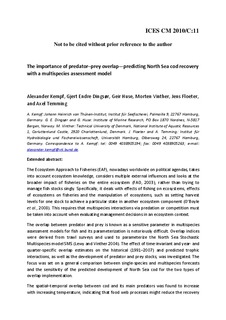| dc.contributor.author | Kempf, Alexander | |
| dc.contributor.author | Dingsør, Gjert Endre | |
| dc.contributor.author | Huse, Geir | |
| dc.contributor.author | Vinther, Morten | |
| dc.contributor.author | Floeter, Jens | |
| dc.contributor.author | Temming, Axel | |
| dc.date.accessioned | 2012-02-06T14:35:38Z | |
| dc.date.available | 2012-02-06T14:35:38Z | |
| dc.date.issued | 2010 | |
| dc.identifier.citation | This report is not to be quoted without prior consultation with the General Secretary. | no_NO |
| dc.identifier.uri | http://hdl.handle.net/11250/102568 | |
| dc.description.abstract | The Ecosystem Approach to Fisheries (EAF), nowadays worldwide on political agendas, takes
into account ecosystem knowledge, considers multiple external influences and looks at the
broader impact of fisheries on the entire ecosystem (FAO, 2003), rather than trying to
manage fish stocks singly. Specifically, it deals with effects of fishing on ecosystems, effects
of ecosystems on fisheries and the manipulation of ecosystems, such as setting harvest
levels for one stock to achieve a particular state in another ecosystem component (O’Boyle
et al., 2008). This requires that multispecies interactions via predation or competition must
be taken into account when evaluating management decisions in an ecosystem context. | no_NO |
| dc.language.iso | eng | no_NO |
| dc.publisher | ICES | no_NO |
| dc.relation.ispartofseries | ICES CM documents;2010/C:11 | |
| dc.subject | cod | no_NO |
| dc.subject | torsk | no_NO |
| dc.title | The importance of predator–prey overlap—predicting North Sea cod recovery with a multispecies assessment model Alexander | no_NO |
| dc.type | Working paper | no_NO |
| dc.subject.nsi | VDP::Agriculture and fishery disciplines: 900::Fisheries science: 920::Resource biology: 921 | no_NO |
| dc.source.pagenumber | 3 s. | no_NO |
